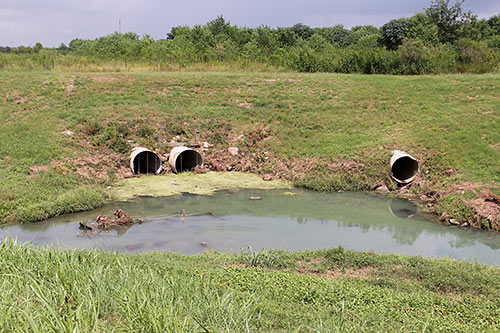NEW BRAUNFELS CANS THE BEER CANS As expected, the city council of New Braunfels voted last night to prohibit the use of any type of disposable container within city limits — including the beer cans that regularly pile up underwater on stretches of the Guadalupe and Comal Rivers popular with tubers. The new ordinance is scheduled to go into effect next January: “The ban was approved – on a 5-1 vote – after one protester had been arrested, another had thrown a volleyball-sized wad of dollar bills at the council, a lawsuit had been promised, and citizens had paraded to the podium for an hour to express their support or opposition.” [Herald-Zeitung; previously on Swamplot] Video of Comal River bottom after Memorial Day: Texas Bottle Bill




Sucks for all the tourist based businesses
So, just buy a few large coolers, fill them with beer, attach a hose to the drain, and drink on! Where there’s a will, there’s a way.
i called BS when i heard this on the news, but it’s hard to argue with the video evidence. i had no idea you people were so poorly raised. once again lawmakers are forced to pick up where parenting left off…
I need to get that patent on floating kegs with multiple drink nozzles…right…now.
Once again the irresponsible actions of a few ruin things for the rest of us.
well i for one will at least congratulate the river on it’s new rights and protections. the reality is the litter is way more than the work of just a few and even encompasses those good natured folks raised on good parenting. litter will exist, whether done by intention or by accident.
how much do the tourist businesses and city cough up to clean the river annually anyhow?
Believe it or not, it IS possible to enjoy the river without alcohol.
in other news, Xtra large CamelPak sales skyrocketed in central Texas Walmarts
Thermos + gin + juice = problem solved.
I’m pretty sure this only effects floating in the actual city limits of New Braunfels, which would be only a stretch of the Guadalupe and all of the Comal. You can probably still have the freedom to drink beer from a can if you go up River Rd. to Sattler or up by Canyon Lake (Horseshoe).
It might be possible to enjoy the river without alcohol, but I sure wouldn’t enjoy it without at least a thermos of water.
And yes, the majority of people using the river these days were raised by jackals and throw beer cans and dirty diapers wherever they choose.
Sure, you can enjoy the river without alcohol. I hope you can enjoy it without your bottled water and/or can of soda. Those count as disposable containers.
Looking at the video…that’s just a ridiculous amount of trash! The ban on bottles and cans is extreme, but SOMETHING has to be done about it. I’m surprised that Texans would be so careless with such a beautiful resource! I guess being drunk and having fun supersedes letting a container get away…
Floating pony kegs and camel baks look to be the way of the future. The smart tubing shops will be renting those too, or some similar solution…something with a deposit and a disposable mouthpiece!
What the city considers disposable I consider recyclable. That’s my argument and reason to still bring cans to the float.
I think I just saw my watch that I lost 3 years ago.
@Meg-O, the problem is that while you may recycle, far too many users of the river choose to just drop the containers in the water. That’s untenable for the long run, and it’s difficult to clean up the river without turning the bottom into a dead zone.
A few (or many) who won’t follow the rules are going to ruin it for everyone.
I question whether the city actually has jurisdiction to do this, especially if the river is classified as a ‘navigable water of the United States’.
Regardless, as Meg-O points out these are recyclable materials, and as others have pointed out this also bars (if the city has authority) non-alcoholic containers, including water bottles. It seems to me the city would do better to set up some intensive law enforcement and fine the scofflaws (which, given the scale of the problem, should both be easy to do and should pay for the law enforcement time), than to try to ban all containers outright.